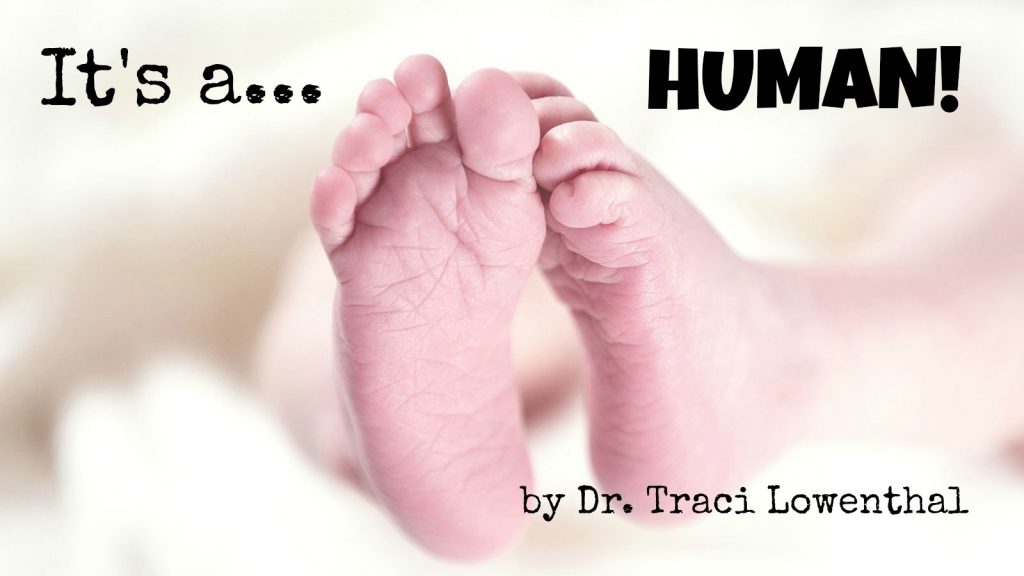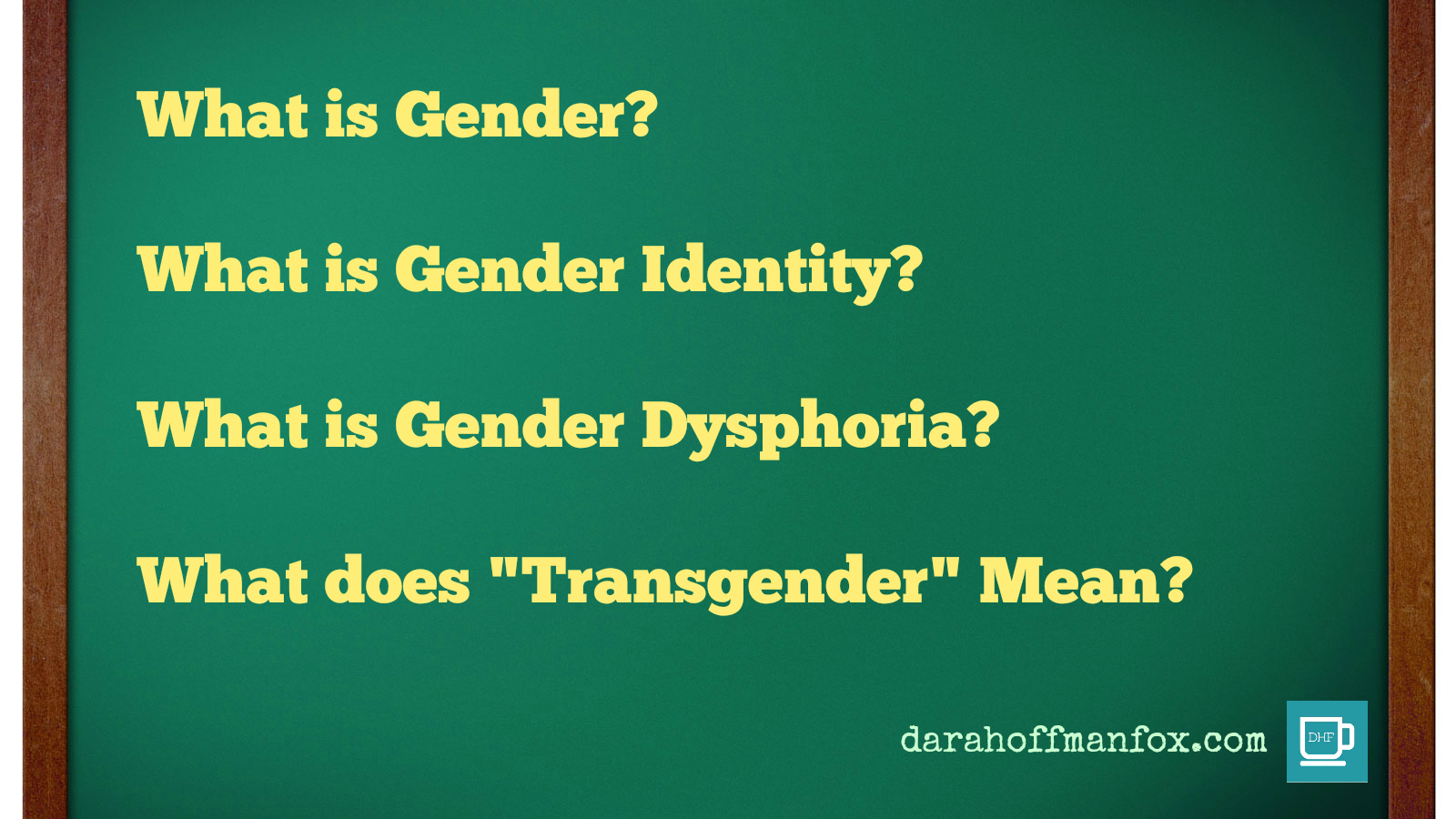“It’s a… Human!” — by Dr. Traci Lowenthal
Guest Post by Dr. Traci Lowenthal
Like most people, I’ve always been aware of gender. As a cisgender person (one who’s biological gender matches that of my identity), most would identity my gender above all else if asked to comment about me.
If I stood in front of you and you were asked to describe me, wouldn’t my gender be among the first things you stated? “I see a woman,” or maybe, “I see a tall woman with blonde hair and glasses.” Gender is such an innate part of our experience and how we perceive others that it’s hard to separate ourselves from it.
I became even more acutely aware of gender when I was pregnant with my first child. The moment I shared my news with someone, two questions were asked: “Do you know what you are having?” and “What are you hoping for?”
My partner and I decided not to inquire about the sex of our baby. This positively unnerved people. It was at first comical to witness their reactions, but then it became disturbing. People needed to know the gender of my child. It was intrusive and uncomfortable that someone would feel such anxiety about the gender of my child.
Not surprisingly, the main reason people wanted to know was to be able to shop for the appropriate colored baby items. People wanted my child to begin to adhere to societal gender norms even before he/she was born. We dressed our child in gender-neutral clothing (because obviously that’s all my frustrated friends and family were allowed to buy).
When we were out in public with our child, it was interesting to watch people struggle with not knowing my child’s gender. “Oh, what a cute little….. baby” or “How old is your little……?” I was a bit cruel about it and let people dance around the question. I was curious what difference it made to know that my cute baby in a neutral colored outfit in a neutral colored stroller had something less neutral contained in their diaper. If they suspected our child was a boy, it changed the descriptive words they used, just as if they perceived a girl child. It truly made people uncomfortable to not know.
Why is gender so important? Has the imposition of gender expectations and stereotypes abated in the last few decades? Are those who identify on the spectrum of gender more free to do so?
One would argue that the answer is yes. After all, haven’t we seen television shows and movies with lead characters who are transgender? Clearly, we are friendlier and more accepting to those who do not fit into a clear-cut category of gender.
But has this newfound acknowledgement changed our early adherence to gender roles? No, it hasn’t. From my perspective, we continue to cling to our gender norms.
Parents magazine indicates that 9 out of 10 new mothers prefer to find out the sex of their unborn child. It’s so important that parents often find out as early as possible and begin imaging our child’s room, their clothing, their future – informed in large part, by gender.
Being aware of our own need to gender our children as early as we can really speaks to how soon our children begin to identify with those gender norms. In kindergarten, my child’s classmates were acutely aware of what were boys’ toys and girls’ toys. It’s common knowledge that colors for children are assigned gender: pink for girls and blue for boys.
An article in Ms. Magazine in 2013 discussed the dramatic increase in gender norms being broken (40 percent of moms are breadwinners now, vs. 11 percent in 1960) but that toys are even more gendered than they were.
I was recently at a 4 year old girl’s birthday party and she received a princess Lego set. One parent remarked, “I’m so glad Lego finally created a girls’ line.” Clearly, for many people (I’d argue the majority) gender rules are as present as they’ve ever been (read more here about gendering as it related to children’s clothing and toys).
What can be done? Does anything need to be done?
As a trans* affirmative psychologist, I’d like to suggest that yes, something needs to be done.
The reason is that for every boy or girl who gladly and comfortably plays with the toys that represent his/her gender according to popular culture, there is a child who experiences incredible confusion and pain about gender. A child for whom choosing the boys’ or girls’ line to enter the classroom each morning feels overwhelming. For gender creative individuals, getting messages early on that they are free to be and engage with items in their lives they feel comfortable with can go a long way toward increasing the likelihood of emotional stability and a healthy self-esteem.
Research shows us that trans* people experience a greater risk of depression and suicidal ideation. Is it due entirely to society’s need to gender them? No, of course not, but does this need to gender lead to discrimination for those outside the binary? Absolutely.
One way this issue is being addressed is through gender-neutral parenting. Gender neutral parenting can done in an extreme way – as in not revealing the gender of your child for years (a family in Toronto has not revealed the gender of their 3 year old child) and less extreme ways (encouraging cross gender play or clothing/hair choices).
For those who aren’t parents, or who don’t really have a chance to embark on gender neutral parenting now, it’s possible to merely have open conversations with friends and family. Ask important questions about how gender impacts our experiences, beliefs and goals. Explore how important your own gender is to you and how it interplays with other aspects of your identity.
Being willing to wrestle with these ideas allows us to be more affirming of those who are exploring their own unique identities.
You may have noticed I never revealed the gender of my child. I wonder how much you struggled with that.
Author Bio
 Dr. Traci Lowenthal is a clinical psychologist in Southern California specializing in working the LGBQ and Trans* Communities. Her passion is helping individuals and families find their way through the socially constructed binary. She is the founder of Creative Insights Counseling and is a member of WPATH. Dr. Lowenthal is a consultant, columnist and blog writer. She also provides supervision for MFT Interns. Dr. Lowenthal is adjunct faculty at the University of Redlands and University of La Verne.
Dr. Traci Lowenthal is a clinical psychologist in Southern California specializing in working the LGBQ and Trans* Communities. Her passion is helping individuals and families find their way through the socially constructed binary. She is the founder of Creative Insights Counseling and is a member of WPATH. Dr. Lowenthal is a consultant, columnist and blog writer. She also provides supervision for MFT Interns. Dr. Lowenthal is adjunct faculty at the University of Redlands and University of La Verne.







Glenn
December 9, 2014 at 12:48 PMThank you for helping to raise awareness. Our oldest child, who is now 5, is gender creative. It is an ongoing struggle to help school staff and other parents recognize their own behaviors that box kids into a binary and stereotypical choice. And while gender-neutral parenting is certainly beneficial for kids that are obviously gender creative, my sense is that it is also beneficial for all of the other kids as well. Showing kids, through consistent words and actions, that they are free to develop their own identity seems like it must be a good thing. I would love to know more about research that has been done to explore that question: whether gender-neutral parenting benefits every child and how.
Traci Lowenthal, Psy.D.
December 9, 2014 at 11:08 PMGlenn, thank you for your comments! I agree! Gender neutral parenting can certainly benefit everyone – not just those that are gender creative! I love the research questions you pose! I will certainly be looking for that info as well! 🙂 Thanks for reading and sharing your thoughts!
Emma
December 9, 2014 at 2:16 PMTL;DR Version: Gender is an evolutionary mechanism that’s beginning to fade as humans gain greater access to reliable resources and are no longer forced to compete for survival or their propagation of genetics. Correlations between gender expression in other primates as compared to human society are observed and made.
Interesting commentary. The more I study the concept of gender throughout human culture, society, and individuals, the more I’m beginning to believe that gendering is an evolutionary byproduct of natural selection among primates and that we, a member of the primate order, have yet to really moved beyond that. I studied anthropology and had a particular interest in the apes closest in relation to humans, and what would shock most people is that gender expression actually played a rather large role in the dynamics of an ape troop. The biological males who displayed the most masculine of traits (large size, muscular, independent, aggressive, competitive, and self-confident) would usually matriculate towards the top of the social hierarchy (often competing for the alpha position) while the males who displayed more feminine traits (dependent, passive, quiet, nurturing, physically small or weak) matriculated towards the bottom of the social hierarchy. The biological females who displayed typically female traits would endeavor to be the mate of the alpha males through competitive displays of (for lack of a better term) sexiness and appearances in fertility. Any of the females who lacked in these areas or displayed more masculine characteristics would tend to not breed or would be forced to take on a lower ranking male for a mate.
Digesting that a bit it becomes evident that displaying appropriate gender expression in the ape troop (their version of society) led to greater access to resources (food, protection) and better chances of breeding with the “fittest” of the group, thereby increasing the chances of passing on favorable genetics to the next generation.
If you look at human culture/society you can start to see some correlations between the hierarchy systems of power, particularly with regards to gender. The most privileged people (those at the top of the system with the most power, influence, and resources) tend to be highly gendered with males displaying highly masculine personalities and females displaying highly feminized personalities (including physical appearance/desirability). Females who display too many masculine traits are seen in a negative light (domineering, stern, and other choice words I’ll leave out). Males who display too many feminine traits are seen as weak, inferior, or less important/influential (also leaving out some choice descriptives normally used).
With the advent of prenatal care and being able to determine sex prior to birth, this genderization process begins even earlier than at any other time in history. In years past baby boys would wear dresses just as baby girls did, and children’s toys would remain mostly gender neutral (as you mentioned above), but thanks to some (Like Frued) we suddenly started worrying that raising a child in a genderless or gender neutral system could lead to psychological issues later in life. As such we started to enforce more and more early development genderization, which is why all the toys, costumes, and TV shows are highly gendered these days.
I believe, however, that we as a species are evolving beyond gender. Because gender is no longer required to ensure survival or even the passing on of genetics, it’s becoming less and less important, and is allowing for greater genetic expressions to occur.
A genetics study of Foxes was conducted in Russia where two systems of breeding were implemented over a few decades. On one side they bred the most aggressive pups with each other (how nature would typically work). On the other they bred the least aggressive pups (defying natural selection by ensuring the “weakest” genetic traits survived). What they found after many generations of new pups was that the aggressive line exhibited pretty typical fox traits, albeit maybe a bit more aggressive. The least aggressive line actually completely changed and started allowing for genetic expressions previously unseen or unknown. The foxes became more docile and friendly, but also started exhibiting amazing new physical features that didn’t serve any sort of survival purpose including fur color, patterns, and softness. They no longer exhibited the traits that naturally selected pups would exhibit and I believe humans are doing the same thing.
Gender isn’t necessary for survival anymore (despite what those at the top of the power scheme want us to believe) and as such, I think that we’ll find that more and more transgender people are being born and allowed to pass on their genetics, especially as awareness and safety increases.
I actually envision a future where gender doesn’t exist at all because everyone will just be an individual with their own gender expression that is completely independent of their ability to access resources or social power.
Traci Lowenthal, Psy.D.
December 9, 2014 at 11:15 PMEmma! Love your ideas and comments! I appreciate all that you said and love exploring these ideas! A genderless society is certainly something I find myself curious about! I wonder about those that enjoy gender though! So many questions! Thanks again for taking the time to read my blog, Emma! 🙂
Emma
December 15, 2014 at 1:35 PMI’ve been thinking about this more and more, and I’m curious to know what everyone thinks. Since we do live in a society that pretty heavily pressures people into the gender binary there really isn’t much of an androgynous or non-gender option to raising your kids (not without great concerted effort or isolation). Eventually almost all of the gender neutral means of raising kids (dressing them androgynously, refusing to give people the sex, refusing to know the sex pre-birth, buying them gender-neutral toys, etc.) falter under social pressure to conform to one or the other, but I’m wondering if there isn’t a different approach that could net similar if not greater benefits than playing the gender-neutrality game. What if, instead of striving to be gender neutral, parents started striving to be bi-gendered in their socialization? I know on the surface we are missing out on a portion of the population that is non-gendered or genderqueer, but bear with me for a moment. If, instead of trying to shelter our children from gender at all, we chose to socialize both boys and girls with both gender polarities (as they exist now) I think we could provide a means of transcending gender altogether. If every child was raised to embrace and accept all the aspects of masculinity and femininity, instead of being pigeonholed into one, we might eventually find ourselves in a genderless (genderful?) society because every child would choose to display, or not display, any or all the gender attributes they wanted. In immediate practical terms, this might manifest in buying the child both GI Joes AND Barbie dolls, both dresses and pants, both princess movies and ninjago movies, both girl legos and boy legos. Correcting the children when they say things like “but that’s what boys do” or “those are for girls” by telling them that nothing is just for girls or just for boys because both boys and girls are humans, and humans can like whatever they want.
Eventually, perhaps, these children would grow up believing that it was neither better, nor worse, to be male or female, but that all gender expression was an act of personal identity.
Thoughts?
Traci Lowenthal, Psy.D.
December 15, 2014 at 10:41 PMHI again, Emma. I appreciate your thought provoking comments and look forward to hearing from others about what you’ve said! For me, what you describe is essentially what I’ve done in my own life and so far it seems to have been positive. I love the idea that gender expression is an act of personal identity! I think that is precisely what so many gender creative individuals are trying to do – assert their very own, individualized identity. I think a society where we are able to simply be who we inherently are would be truly beautiful. I am hopeful that such a society is possible. I feel that conversations like these are a way toward a less constrained experience of gender. And, I LOVE genderful!! Thank you again, Emma! 🙂
Traci
Sam Skubecz
March 17, 2015 at 12:30 PMAs an FTM teen who’s been differential since birth, I can promptly say that had I know what differential genders were since birth, I may have grown up a lot more comfortably. I fully support the decisions of gender-neutral parenting and encourage them; all the topics you cover in this article accurately portray and express what I’ve been trying to argue in a concise and thoughtful, intriguing way. Thank you so much for writing this, I’m going to share it with my father-to-be cousin!
Traci Lowenthal, Psy.D.
March 17, 2015 at 7:22 PMHey Sam!! Thank you so much for your kind comments! I am thrilled that this blog had a positive feel for you! Glad to hear it’s share-worthy! Awesome!
Have a great day!
Traci